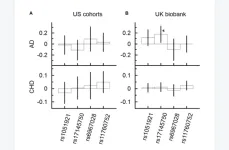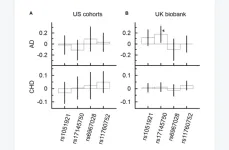(Press-News.org) Toronto, ON - The US Surgeon General issued an advisory on social media and youth mental health a week after the American Psychological Association issued a health advisory on social media use in adolescence. Both advisories note potential links between social media use and poor sleep quality in teens. Given these concerns, what specific actions can teens and parents take to optimize sleep?
A new national study, published in Sleep Health, offers insights into screen habits linked with better sleep.
“Getting enough sleep is crucial for teenagers because it helps their body and mind grow and develop properly,” says lead author Jason Nagata, MD, assistant professor of pediatrics at the University of California, San Francisco. “Our research found that keeping screens outside of the bedroom, turning off device notifications, and avoiding social media use in bed is associated with better sleep among adolescents. If you wake up during the night, don’t check your phone or social media.”
Keep screens outside of the bedroom. Having a TV set or internet-connected device in the bedroom was associated with a 27% higher risk of having trouble falling or staying asleep.
Turn of the ringer and notifications. Leaving the phone ringer on was associated with 23% higher risk of having trouble falling or staying asleep compared to turning it off. 16.9% of adolescents reported having a phone call, text message, or e-mail wake them up after trying to go to sleep in the past week.
Don’t use social media or other electronic devices before going to sleep. Using social media, chatting on the internet, playing video games, browsing the internet, and watching or streaming movies, videos, or TV shows while in bed before sleeping were all associated with trouble falling or staying asleep.
If you wake up during the night, don’t use your phone or engage with social media. One fifth of adolescents reported that they used their phone or other device after waking up during the night in the past week. This was associated with a 34% higher risk of sleep troubles.
The researchers analyzed data from 10,280 preteens aged 10-14 who are part of the Adolescent Brain Cognitive Development Study, the largest long-term study of brain development and child health in the United States. Data were collected from 2018 to 2020. The adolescents and their parents answered questions about their sleep habits and youth were asked about their screen and social media use at bedtime. 15.5% of preteens reported at least several days of trouble falling or staying asleep in the past two weeks. 16.9% reported being woken up by phone calls, text messages, or emails while sleeping at least once in the past week. Furthermore, 20.0% reported using their phone or another device if they woke up overnight.
“Adolescents may be hypervigilant to the sounds of phone notifications and immediately awaken to the sound of their phone,” said Nagata.
“Adolescent development is a challenging time for many given the social pressures and physical, psychological, and emotional changes that occur,” said co-author, Kyle T. Ganson, PhD, MSW, assistant professor at the University of Toronto's Factor-Inwentash Faculty of Social Work. “Understanding the centrality of social media and smartphones to this developmental process, and being present, is crucial for parents to their child.”
END
Unlocking restful nights: unveiling teen-friendly social media habits for optimal sleep
New research finds that keeping screens outside the bedroom, turning off notifications, and avoiding social media use in bed is associated with better sleep in adolescents
2023-05-24
ELSE PRESS RELEASES FROM THIS DATE:
Researchers map the brain during blood sugar changes
2023-05-24
EL PASO, Texas (May 24, 2023) – Researchers at The University of Texas at El Paso have successfully mapped specific regions in the brain that are activated in association with changes in blood sugar — also known as glucose — providing fundamental location information that could ultimately lead to more targeted therapies for people who struggle with conditions like diabetes.
The landmark 13-year study, published in the Journal of Clinical Medicine, describes how the team used careful microscopic analysis to pinpoint specific cell populations ...
External factors shape genetic predisposition to lipids, Alzheimer’s and heart disease in MLXIPL gene
2023-05-24
“Recent findings suggest that neurodegenerative and cardiovascular diseases may have overlapping etiologies [...]”
BUFFALO, NY- May 24, 2023 – A new research paper was published in Aging (listed by MEDLINE/PubMed as "Aging (Albany NY)" and "Aging-US" by Web of Science) Volume 15, Issue 9, entitled, “Exogenous exposures shape genetic predisposition to lipids, Alzheimer’s, and coronary heart disease in the MLXIPL gene locus.”
In this new study, researchers Yury Loika, Elena Loiko, Fan ...
A student’s poor eating habits can lead to a lifetime of illness
2023-05-24
A UBC Okanagan researcher is cautioning that a person’s poor eating habits established during post-secondary studies can contribute to future health issues including obesity, respiratory illnesses and depression.
Dr. Joan Bottorff, a Professor with UBCO’s School of Nursing, is one of several international researchers who published a multi-site study looking at the eating habits of university students. Almost 12,000 medical students from 31 universities in China participated in the study that aimed to determine the association between eating behaviours, obesity and various diseases.
The point, ...
Recent UCLA computer grad constructs “Crown Jewel of Cryptography”
2023-05-24
ACM, the Association for Computing Machinery, today announced that Aayush Jain receives the 2022 ACM Doctoral Dissertation Award for his dissertation “Indistinguishability Obfuscation from Well-Studied Assumptions,” which established the feasibility of mathematically rigorous software obfuscation from well-studied hardness conjectures.
The central goal of software obfuscation is to transform source code to make it unintelligible without altering what it computes. Additional conditions may be added, such as requiring the transformed code to perform ...
Meet the 2023 ASBMB Advocacy Training Program delegates
2023-05-24
The American Society for Biochemistry and Molecular Biology announced the 12 delegates who will participate in the society’s Advocacy Training Program this summer.
The ATP is a three-month summer externship that provides hands-on science policy and advocacy training and experience. After completing the educational component of the program, delegates will visit Capitol Hill to meet with policymakers in 2024. The ASBMB public affairs department runs the program.
The society has trained 42 ASBMB members in four ATP cohorts, providing the foundational knowledge, skills ...
Does having Alzheimer’s genes increase your risk of epilepsy?
2023-05-24
MINNEAPOLIS – People with a genetic predisposition for Alzheimer’s disease may have an increased risk of epilepsy and people with a certain type of epilepsy may have an increased risk of developing Alzheimer’s disease, according to a study published in the May 24, 2023, online issue of Neurology®, the medical journal of the American Academy of Neurology.
“Our research found that not only are people with Alzheimer’s disease more likely to develop epilepsy, but also that those with focal epilepsy, which accounts for ...
New study shows 1 in 5 “healthy” individuals actually have the metabolism of a prediabetic
2023-05-24
Scientists at Klick Labs have developed a new way to catch the earliest signs the human body is failing to control blood glucose levels, before it reaches prediabetic levels in patients.
In findings published today in Mayo Clinic Proceedings: Digital Health, researchers outlined a new method of analysis that flags a precursor to prediabetes called impaired glucose homeostasis (IGH). When they applied their patented mathematical method to data obtained from continuous glucose monitors (CGMs), scientists found about one in five study participants, considered healthy by medical standards, actually had glucose metabolism similar to those with prediabetes.
“For people ...
New UCI-led research shows people who live to be 90+ with superior thinking skills are resilient to Alzheimer’s pathology in their brains
2023-05-24
Irvine, CA – May 24, 2023 – A University of California, Irvine-led team of researchers have discovered that the oldest-old, those who live to be 90+ and have superior cognitive skills, have similar levels of brain pathology as Alzheimer’s patients, however, they also have less brain pathology of other neurodegenerative diseases that cause memory and thinking problems.
The study, “Superior Global Cognition in Oldest-Old is Associated with Resistance to Neurodegenerative Pathologies: Results from the 90+ Study,” was published in the Journal of Alzheimer’s Disease.
“People ...
Survival pathway and therapeutic target in metastatic colorectal and pancreatic cancer
2023-05-24
“Recent findings suggest that neurodegenerative and cardiovascular diseases may have overlapping etiologies [...]”
BUFFALO, NY- May 24, 2023 – A new research paper was published in Aging (listed by MEDLINE/PubMed as "Aging (Albany NY)" and "Aging-US" by Web of Science) Volume 15, Issue 9, entitled, “Exogenous exposures shape genetic predisposition to lipids, Alzheimer’s, and coronary heart disease in the MLXIPL gene locus.”
In this new study, researchers Yury Loika, Elena Loiko, Fan Feng, Eric Stallard, Anatoliy I. Yashin, Konstantin Arbeev, Allison L. Kuipers, Mary F. Feitosa, Michael A. Province, and Alexander ...
Researchers identify strong T-cell response in first-in-human nanoparticle HIV vaccine
2023-05-24
SEATTLE – MAY 24, 2023 – Researchers from Fred Hutchinson Cancer Center in Seattle, Scripps Research in La Jolla, California, IAVI and other collaborating institutions have characterized robust T-cell responses in volunteers participating in the IAVI G001 Phase 1 clinical trial to test the safety and immune response of a self-assembling nanoparticle HIV vaccine.
Their work, published in Science Translational Medicine, signals a major step toward development of a vaccine approach to end the HIV/AIDS ...
LAST 30 PRESS RELEASES:
Researchers develop new strategy for improving inverted perovskite solar cells
Yes! The role of YAP and CTGF as potential therapeutic targets for preventing severe liver disease
Pancreatic cancer may begin hiding from the immune system earlier than we thought
Robotic wing inspired by nature delivers leap in underwater stability
A clinical reveals that aniridia causes a progressive loss of corneal sensitivity
Fossil amber reveals the secret lives of Cretaceous ants
Predicting extreme rainfall through novel spatial modeling
The Lancet: First-ever in-utero stem cell therapy for fetal spina bifida repair is safe, study finds
Nanoplastics can interact with Salmonella to affect food safety, study shows
Eric Moore, M.D., elected to Mayo Clinic Board of Trustees
NYU named “research powerhouse” in new analysis
New polymer materials may offer breakthrough solution for hard-to-remove PFAS in water
Biochar can either curb or boost greenhouse gas emissions depending on soil conditions, new study finds
Nanobiochar emerges as a next generation solution for cleaner water, healthier soils, and resilient ecosystems
Study finds more parents saying ‘No’ to vitamin K, putting babies’ brains at risk
Scientists develop new gut health measure that tracks disease
Rice gene discovery could cut fertiliser use while protecting yields
Jumping ‘DNA parasites’ linked to early stages of tumour formation
Ultra-sensitive CAR T cells provide potential strategy to treat solid tumors
Early Neanderthal-Human interbreeding was strongly sex biased
North American bird declines are widespread and accelerating in agricultural hotspots
Researchers recommend strategies for improved genetic privacy legislation
How birds achieve sweet success
More sensitive cell therapy may be a HIT against solid cancers
Scientists map how aging reshapes cells across the entire mammalian body
Hotspots of accelerated bird decline linked to agricultural activity
How ancient attraction shaped the human genome
NJIT faculty named Senior Members of the National Academy of Inventors
App aids substance use recovery in vulnerable populations
College students nationwide received lifesaving education on sudden cardiac death
[Press-News.org] Unlocking restful nights: unveiling teen-friendly social media habits for optimal sleepNew research finds that keeping screens outside the bedroom, turning off notifications, and avoiding social media use in bed is associated with better sleep in adolescents




